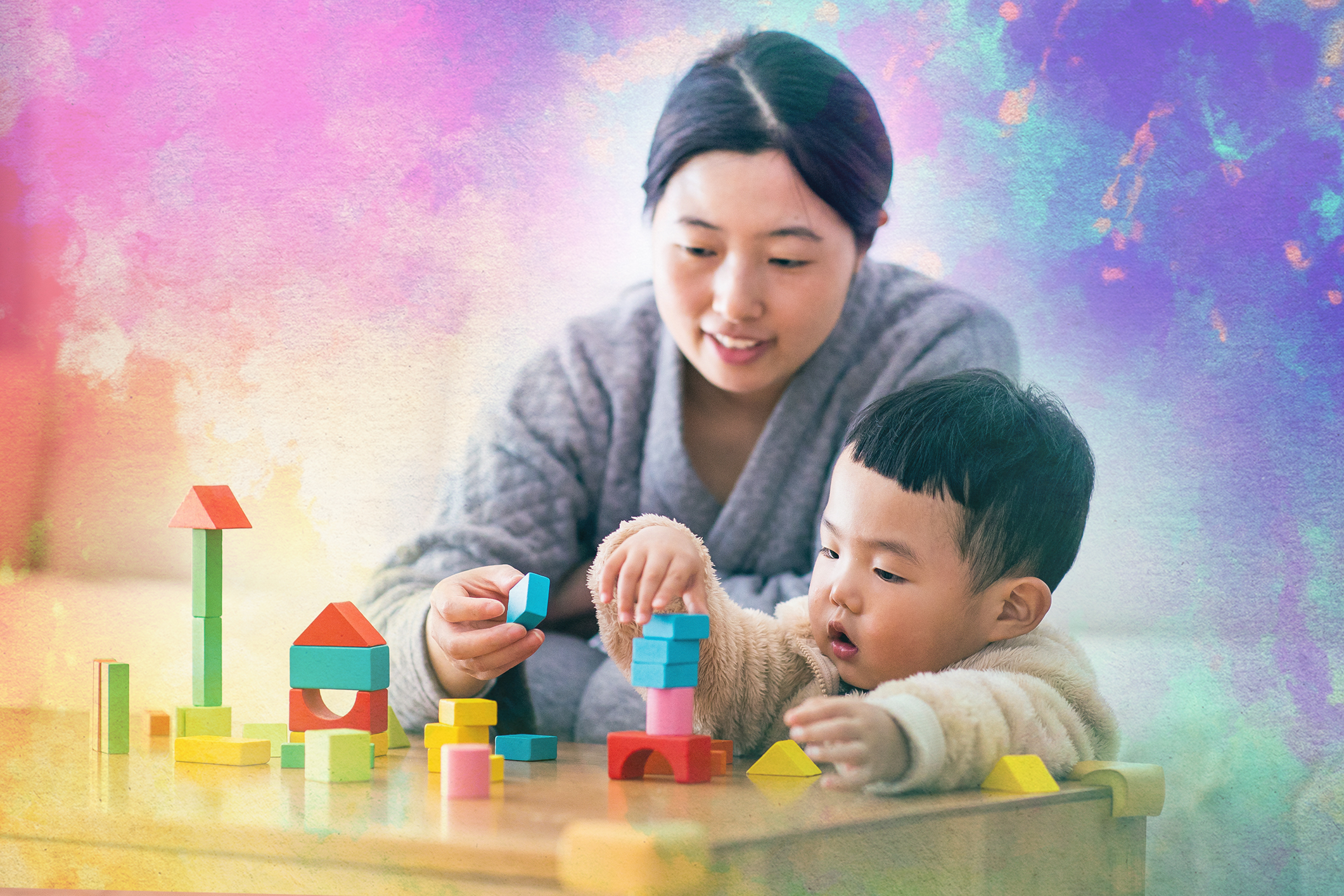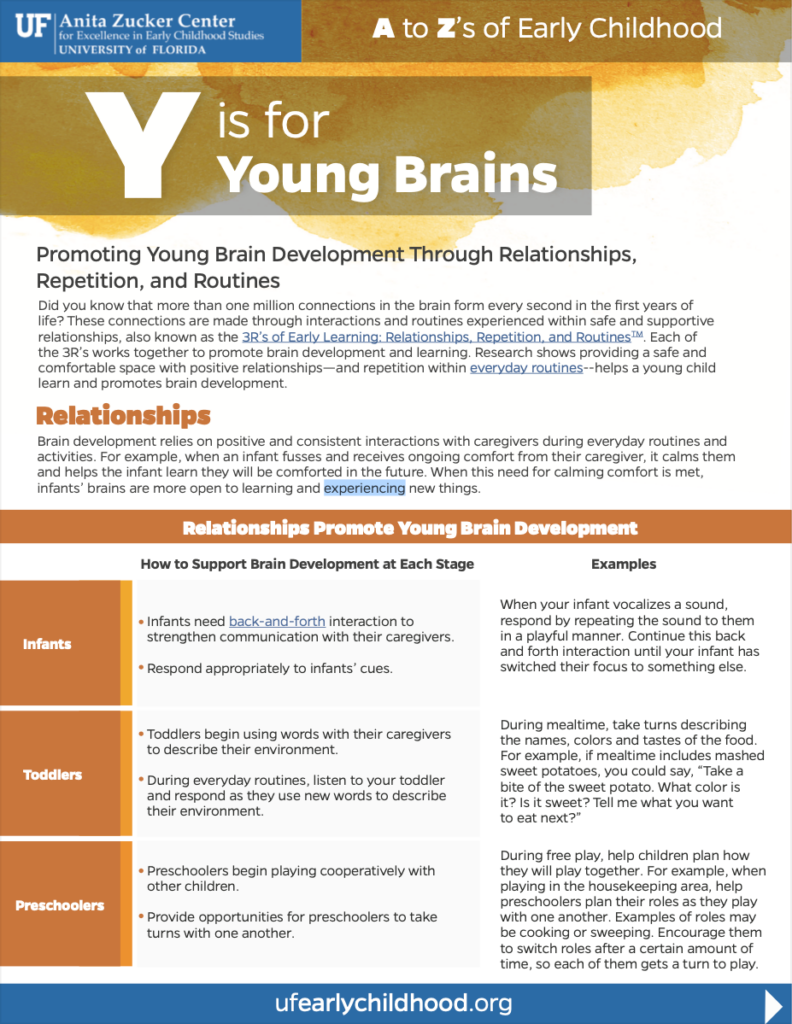A to Z’s of Early Childhood
The Science of Child Development and Learning
Y is for Young Brains
Did you know that more than one million connections in the brain form every second in the first years of life? These connections are made through interactions and routines experienced within safe and supportive relationships, also known as the 3R’s of Early Learning: Relationships, Repetition, and Routines™. Each of the 3R’s works together to promote brain development and learning. Research shows providing a safe and comfortable space with positive relationships—and repetition within everyday routines–helps a young child learn and promotes brain development.

Supporting a Young Child's Developing Brain Through Relationships, Repetition, and Routines
Relationships
Brain development relies on positive and consistent interactions with caregivers during everyday routines and activities. For example, when an infant fusses and receives ongoing comfort from their caregiver, it calms them and helps the infant learn they will be comforted in the future. When this need for calming comfort is met, infants’ brains are more open to learning and experiencing new things.
| Relationships Promote Young Brain Development | ||
| How to Support Brain Development at Each Stage | Examples | |
| Infants |
|
When your infant vocalizes a sound, respond by repeating the sound to them in a playful manner. Continue this back and forth interaction until your infant has switched their focus to something else. |
| Toddlers |
|
During mealtime, take turns describing the names, colors and tastes of the food. For example, if mealtime includes mashed sweet potatoes, you could say, “Take a bite of the sweet potato. What color is it? Is it sweet? Tell me what you want to eat next?” |
| Preschoolers |
|
During free play, help children plan how they will play together. For example, when playing in the housekeeping area, help preschoolers plan their roles as they play with one another. Examples of roles may be cooking or sweeping. Encourage them to switch roles after a certain amount of time, so each of them gets a turn to play. |
Repetition
Research shows children learn better when given opportunities to experience the same things in the same environment over and over again. This repetition helps strengthen the brain’s development, allowing children to practice a skill or learn new things. Young children often ask for things repeatedly, such as reading a favorite book, playing with a favorite toy or asking for the same favorite food.
| Repetition Promotes Young Brain Development | ||
| How to Support Brain Development at Each Stage | Examples | |
| Infants |
|
Using stacking or shape sorting toys, encourage and support your infant to use their hands to manipulate the toys. Once they are done sorting or stacking, help them reset the toys and repeat the actions. |
| Toddlers |
|
Throughout the day, sing songs that repeat the same words or phrases over and over (e.g., “The Wheels on the Bus”). |
| Preschoolers |
|
Every day while driving in the car, play the same game over and over, such as “I Spy,” and ask them questions to help them talk about and describe the things they are seeing. |
Routines
Young children depend on caregivers to provide opportunities for them to develop skills and learn new things. One way to offer those opportunities is through everyday routines and activities. For example, a caregiver may provide a routine, such as reading at bedtime, which helps build caregiver relationships and supports language development.
| Routines Promote Young Brain Development | ||
| How to Support Brain Development at Each Stage | Examples | |
| Infants |
|
At the beginning of every changing routine, hold up an infant’s shirt so they can see it. Then say, “We’re going to put your shirt on. Ready?” each time before lifting their arms and putting it on. |
| Toddlers |
|
When getting ready during the morning routine, consistently provide cues to let your toddler know which part of the routine will be next. For example, while your toddler is eating breakfast, say, “Once we are done eating, it will be time to go and brush our teeth.” |
| Preschoolers |
|
In an early childcare setting, maintain consistent schedules throughout the day but allow children to have choices andIn an early childcare setting, maintain consistent schedules throughout the day but allow children to have choices and flexibility. For example, during scheduled center time, allow preschoolers to choose which center they want to play in first. |
What We and Our Partners are Doing
The Anita Zucker Center and our collaborators are helping families and practitioners promote young brain development and learning through the 3R’s of Early Learning: Relationships, Repetition, Routines™.
Learn more:
- Embedded Practices and Intervention with CaregiversThis early intervention approach helps parents and other caregivers provide embedded learning opportunities for infants and toddlers with disabilities during everyday routines and activities.
- Pyramid Model Consortium
The Pyramid Model for Promoting Social and Emotional Competence in Infants and Young Children is a support framework that organizes evidence-based practices that caregivers and practitioners use to support young children’s social, emotional, and behavioral competence. The Pyramid Model Consortium consists of individuals who have been involved in the development, refinement, and evaluation of the Pyramid Model.
Other Resources
- InBrief: The Science of Early Childhood Development
This brief from Harvard University’s Center on the Developing Child is part of a series that summarizes the Center’s essential scientific findings on human brain development. - 5 Steps for Brain-Building Serve and Return
This resource, by the Center on the Developing Child at Harvard University, details five steps for serve-and-return interactions with an overview video and downloadable PDFs in English and Spanish. - Early Brain Development and Health
This brief article from the CDC, available in English and Spanish, outlines factors impacting early brain development and health. It includes several links to related articles for more information. - Creating Routines for Love and Learning
This parenting resource from Zero to Three describes how routines help improve self-control, social skills, and parenting happiness, among other benefits. - Caring Relationships: The Heart of Early Brain Development
This online publication from the National Association for the Education of Young Children (NAEYC) gives research-based descriptions of brain development during each stage of a young child’s life, from birth to 36 months. - Florida Early Learning Developmental Standards and Professional Competencies: Families
The Florida Early Learning and Developmental Standards help caregivers support young children’s learning and development from birth to age five. It includes resources, activities, and information caregivers can use at home.
Articles by Center Faculty and Collaborators
- Han, H. S., & Kemple, K. M. (2006). Components of social competence and strategies of support: Considering what to teach and how. Early Childhood Education Journal, 34(3), 241-246. https://doi.org/10.1007/s10643-006-0139-2
- Luo, L., Snyder, P., Huggins-Manley, A. C., Conroy, M., & Hong, X. (2021). Chinese preschool teachers’ implementation of practices to support young children’s social-emotional competence. Early Education and Development, 32(8), 1083-1102. https://doi.org/10.1080/10409289.2020.1841594
- Scott, L. S. (2011). Mechanisms underlying the emergence of object representations during infancy. Journal of Cognitive Neuroscience, 23(10), 2935-2944. https://doi.org/10.1162/jocn_a_00019
- Scott, L. S., & Monesson, A. (2010). Experience-dependent neural specialization during infancy. Neuropsychologia, 48(6), 1857-1861. https://doi.org/10.1016/j.neuropsychologia.2010.02.008
- Scott, L. S., & Monesson, A. (2009). The origin of biases in face perception. Psychological Science, 20(6), 676-680. https://doi.org/10.1111/j.1467-9280.2009.02348.x
- Snyder, P. A., McLaughlin, T., & Bishop, C. (2018). Maximizing contextually relevant learning opportunities through embedded instruction. In P. A. Snyder & M. L. Hemmeter (Eds.), Instruction: Effective strategies to support engagement, learning, and outcomes: DEC Recommended Practices Monograph Series (No. 4, pp. 51-64). Division for Early Childhood.
- Wang, F., Cox, M. J., Mills-Koonce, R., & Snyder, P. (2015). Parental behaviors and beliefs, child temperament, and attachment disorganization. Family Relations, 64(2), 191-204. https://doi.org/10.1111/fare.12120
References
- Centers for Disease Control and Prevention. (2023, February 24). Early brain development and health. https://www.cdc.gov/ncbddd/childdevelopment/early-brain-development.html
- National Research Council, & Institute of Medicine. (2000). From neurons to neighborhoods: The science of early childhood development. National Academy Press. https://doi.org/10.17226/9824
- Lally, J. R., & Mangione, P. L. (2017). Caring relationships: The heart of early brain development. Young Children, 72(2). https://www.naeyc.org/resources/pubs/yc/may2017/caring-relationships-heart-early-brain-development
- LoBue, V. (2019, July 10). Why children like repetition, and how it helps them learn. Psychology Today. https://www.psychologytoday.com/us/blog/the-baby-scientist/201907/why-children-repetition-and-how-it-helps-them-learn
Receive Additional Support
The complete 3R’s of Early Learning downloadable video recordings (including the A to Z’s of Early Childhood) for use in the field of childhood development to facilitate learning are available for purchase.
If you would like to purchase these resources or speak with a member of our team for help in providing professional development, please complete this contact form.

